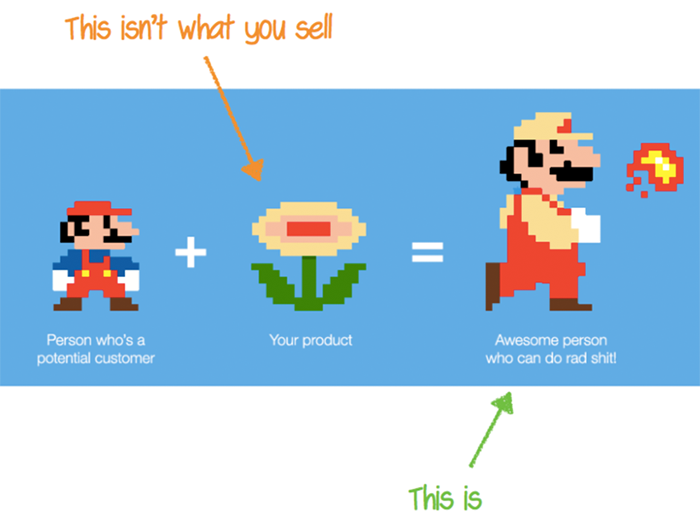I absolutely love this image. It clearly communicates how we should be thinking about developing and marketing our products. The customer is focused on their pain point and looking to the open market to provide them with their solution. Your product isn’t what they want, the end result is. Your customer doesn’t want your vacuum cleaner, they want a clean apartment. They don’t want an iPhone, they want the solutions it brings: the mobile business management, staying in touch with friends and family, etc.

Pain Dream Fix
“Pain, Dream, Fix” is a strategy originally used for creating great sales copy and has become something that many designers, both physical and digital, use every day. It puts you in the mind of the user and helps you to empathize with their current pains, think about their dream without the pain, and present them with the solution that would make the pain go away. Let’s take a minute and use this strategy to understand Mario’s and his problem:
- Pain – Mario needs to defeat his enemies, but he is woefully outmatched. His enemies are larger than him, faster, and better armed. Jumping on them works, but he risks being hurt.
- Dream – Mario knows that if he were to be bigger and, maybe, be able to throw something (like fire) at his enemies, he would have a much better chance of surviving and rescuing the princess.
- Fix – Mario finds the product, a fire flower, and now can easily defeat his enemies from a safe distance! He is able to achieve his goals.
As you can see, without this strategy it would have been difficult for Mario to find success. As a product/solutions developer, if you fail to understand the user, you risk distancing yourself from them. You are trying to sell them a solution to a problem they don’t have. Once you use “Pain, Dream, Fix” to accurately identify the pain points and envisioned the dream, the fix becomes an easy sell. You can offer the right solution because you truly understand the users struggle and what they see as the ideal outcome.
Henry Ford famously said,
“If I had asked people what they wanted, they would have said faster horses.”
Not only did Mr. Ford bring people the “faster horse” (pain fix), but he brought them something completely different while solving their pain. He brought them the dream.
Image from Samuel Hallick’s book User Onboarding which I highly recommend that you get.